Christine Valters Paintner's Blog, page 75
November 2, 2019
Christine's Prayer Practice
 Dear monks, artists and pilgrims,
Dear monks, artists and pilgrims,
Blessings during this month of remembrance (November) when the veil between worlds is considered to be especially thin and we honor the ancestors of blood and spirit. I love this time of year, especially because we are actively reminded in both Celtic and Christian traditions that we have the love of thousands supporting us and offering us guidance and wisdom for our lives. As many of you know, ancestral healing work, as well as calling on the mystics, has been a central part of my spiritual practice for many years.
I sometimes get asked what my own prayer practice looks like so I thought I'd share an outline of a prayer that I have been using for some time now as part of my morning meditation calling in the divine, angelic, mystical, ancestral, and earthly presences that are available to all of us for support. It is a sequence I put together for my own needs and you are of course welcome to take parts of it and adapt for your situation (the names, songs, and types of herbs/oils). I have a song list I play and the prayer always unfolds intuitively (I wrote down parts of it here as an offering, again let your own words inhabit the prayer). I'll switch out songs as I find new ones that inspire. And sometimes I do this prayer without music at all.
*Playlist of Songs*
https://www.youtube.com/playlist…
(Simon's Archangel Blessing is not on YouTube but you can find that song here: https://soundcloud.com/simon-de-voil/arc-angel)
HERBS – Burn smoke stick/incense to circle myself and open channel of connection between worlds (rosemary is especially for remembrance)
I begin by calling my energy back to me from all the places and situations where my attention has become scattered so that I might be fully present to the ways the sacred wants to be revealed to me this day. I open my heart to connection beyond the veil and to welcome in the many unseen presences who are here to support and guide me.
SONG – The Christ Hymn – Alana Levandoski
I call upon the presence of the Divine One, Sophia, the Source of Love and Wisdom, Mary, the Great Mother, Jesus the Incarnate One, may I feel your support in tangible ways and may you empower me to be a force for love in this world.
SONG – Archangel Invocation – Simon de Voil
I ask all the angels and archangels and those tasked with offering me protection and guidance to be present and keep all that would wish me harm at a distance.
SONG – Prayer of St Francis – Simon de Voil
I call upon the saints and mystics, especially Hildegard, Benedict, Clare, Francis, Brigid, Brendan, Gobnait, Ita, Kevin, and all the holy ones who have lived in the grace and fullness of love to be with me this day.
SONG – Calling All Angels – Jane Siberry
I call upon the ancestors –
The grandmother of grandmothers and grandfather of grandfathers (the names I use for my mother's motherline and fatherline)
My great great great great great great great grandmother and my great great great great great great great grandfather (the names I use for my father's motherline and fatherline)
And all of the other ancestors who are healed, well, and vibrant in spirit to be with me, support me, and guide me.
I invite the divine, angelic, mystical, and ancestral presences to encircle me, creating a boundary and container of love.
SONG – Canticle of Creation – Simon de Voil
HERBS – Drink a ritual cup of tea to infuse and nourish me with the gifts of the earth
I call upon the elements of water to bless, wind to enliven, earth to ground, and fire to spark, I ask that the land I live upon and the sea which borders it, the rivers and lakes, forests and mountains, the creatures and plants I share this place with, and the lands of my ancestors to nourish and support me and help me to celebrate life in its many abundant manifestations.
SONG – Listen to my Sighing – Richard Bruxvoort Colligan
I offer my deep and profound grief over all of the world's woundedness, I cry out in lament over the thousands of ways we daily subvert love for power and all the ways I participate in and uphold a broken and corrupt system which neglects the needs of those on the margins and causes untold suffering. I confess the ways I have fallen short and re-commit myself to being a presence and force for love and creativity.
SONG – Lost Words Blessing – Karine Polwart
I offer prayers for people and situations in the world who are especially weighing on my heart (naming them here).
I ask that all of these seen and unseen presences help to nourish me in my work and service to the world, in my path of healing my own wounds as well as extending healing space to others.
I ask that my night dreams be blessed with vision and new possibilities. May I be someone who helps create new pathways forward.
HERBS – Anointing oil to bless my day and work ahead. (I tend to use rose for healing of the heart, angelica for the archangels' protection, frankincense for the sacred masculine, mugwort for cultivation of night dreams)
SILENT MEDITATION
SONG – Behold, I Make All Things New – Alana Levandoski
I often end by reading a poem and practice lectio divina with it followed by time for journaling.
With great and growing love,
Christine
Christine Valters Paintner, PhD, REACE
Photo © Christine Valters Paintner
October 29, 2019
Monk in the World Guest Post: Kirsten Murray-Borbjerg
I am delighted to share another beautiful submission to the Monk in the World guest post series from the community. Read on for Kirsten Murray-Borbjerg's reflection on God revealed through the stranger.
I most often meet God as revealed through the stranger while dancing like a broken windup toy. Dancing is probably not a passion you would imagine a wheelchair user having. But I fell head over heels in love with dancing shortly after the mysterious illness causing me to fall head over heels for no reason at all was finally diagnosed. Despite chronic ill health my passion for music can still entice me into the world. I've found that within dance floors dwells a holy sanctuary. A place where the constant questions about my health fall silent for in that sacred space the music is so loud the only words that can be spoken are words spoken in song. Strangers often tell me of their delight in having seen me dance all night long with such joy and confidence. Sweaty and happy I tell them my secret – my body is having a good day so I came out to celebrate her. For all the sermons I've heard and healing prayers I've had nothing has helped me understand love incarnated more than living with chronic illness and learning to dance despite it.
My spiritual dance began with a deep curiosity about monastic rhythms of life. In 2010 while at an art exhibition I got talking to a Dominican Father about my rhythm of life as an Artist. The dark months were setting in and I had not long brought my darkroom equipment out of hibernation. He said the image of me in the world with my camera during the summer months, and then at home in my darkroom during the winter months, made him think of how the life of a Monk changes with the seasons. The image of the Monks in their fields and then at their books took root deep in my heart and never left. My faith journey was primed for monasticism as my spiritual journey had commenced with a decision to take 12 steps away from some very chaotic drinking and into what is now 10 years of sobriety. The 12 step program is essentially a Rule for Life so for me 'church' was always going to be an expression of monasticism.
Finding the Abbey of the Arts and the Holy Disorder of Dancing Monks feels like an answer to prayer I didn't know I was praying. Sobriety had brought with it a Rule for Life. My artistic work had brought holy rhythms, creative contemplation, and reflection on the changing seasons. Chronic illness brought into my life the practice of praying the hours and an understanding of solitude as a spiritual treasure. My need for connection with the Body – my own body as well as the body of those who believe in love, joy, peace, patience, kindness, goodness, faithfulness, gentleness and self-care – brought dance as a spiritual practice into my life. And yet there was a need for something more. While I was clearly growing and on a path that seemed perfect for me I longed for a guide. After a fruitless search I made up my mind to write my own Rule for Life that would support my flourishing as an artist. Almost immediately I read about the Abbey for the Arts.
While I have only been a Dancing Monk for a short period I have found the guidance of our online Abbess transformative. This year I am working my way through the Artists Rule, Eyes of the Heart and The Wisdom of the Body. On my pilgrimages into the world to dance I reflect on the "Do You…?" questions. On New Year's Eve I had an experience that made me question whether I do honor the profound dignity of each person, regardless of culture, gender etc. I was making my way to the disabled toilet with some difficulty because in the crowd people couldn't see my walking stick. One man who saw my stick took my lack of mobility as an opportunity to score a dance. As he drunkenly danced in front of me, blocking my path to the toilet, I couldn't see past his straight white cis male privilege to anything that was akin to profound dignity.
Then I came face to face with God; as revealed in the stranger. A young Trans woman was making her way in my direction. She saw my stick and moved making a make a clear path for me to get by. She saw me and I saw her. I'd seen the hyper vigilance with which she was navigating the crowd. So often the stranger does not reflect the face of God to those in the Trans community. Despite my urgent need to make my way to the bathroom I stopped to thank her for her kindness. I told her about the man I'd just escaped from and how much her seeing me had meant. "Bless you!" she said sorrowfully before gently kissing my cheek and wishing me a Happy New Year. Receiving a blessing, the sign of the peace, and good wishes for the year ahead felt all the more profoundly spiritual for having taken place in a busy night club. As you dance through life you can meet God anywhere. And in truth I often see God in the faces of straight white cis men as they tell their stories of what it used to be like when they were still drinking.
 Kirsten Murray-Borbjerg is an artist, storyteller and social entrepreneur currently studying a degree in Theology, Ministry and Mission at Durham University. Her most recent art exhibition was at Newcastle Cathedral where she exhibited the first installment of "Gathered Together" – a reflection on blood donation, sex-work, addiction and communion.
Kirsten Murray-Borbjerg is an artist, storyteller and social entrepreneur currently studying a degree in Theology, Ministry and Mission at Durham University. Her most recent art exhibition was at Newcastle Cathedral where she exhibited the first installment of "Gathered Together" – a reflection on blood donation, sex-work, addiction and communion.
October 26, 2019
Monk In the World: Community 2 – Scripture Reflection by John ~ A Love Note from Your Online Prior
 Dearest monks, artists, and pilgrims,
Dearest monks, artists, and pilgrims,
During this Jubilee year of sabbatical we are revisiting our Monk Manifesto by moving slowly through the Monk in the World retreat materials together every Sunday. Each week will offer new reflections on the theme and every six weeks will introduce a new principle.
Principle Three: I commit to cultivating community by finding kindred spirits along the path, soul friends with whom I can share my deepest longings, and mentors who can offer guidance and wisdom for the journey.
Nehemiah 1:1-11
Nehemiah Prays for His People
The words of Nehemiah son of Hacaliah. In the month of Chislev, in the twentieth year, while I was in Susa the capital, one of my brothers, Hanani, came with certain men from Judah; and I asked them about the Jews that survived, those who had escaped the captivity, and about Jerusalem. They replied, 'The survivors there in the province who escaped captivity are in great trouble and shame; the wall of Jerusalem is broken down, and its gates have been destroyed by fire.'
When I heard these words I sat down and wept, and mourned for days, fasting and praying before the God of heaven. I said, 'O LORD God of heaven, the great and awesome God who keeps covenant and steadfast love with those who love him and keep his commandments; let your ear be attentive and your eyes open to hear the prayer of your servant that I now pray before you day and night for your servants the people of Israel, confessing the sins of the people of Israel, which we have sinned against you. Both I and my family have sinned. We have offended you deeply, failing to keep the commandments, the statutes, and the ordinances that you commanded your servant Moses. Remember the word that you commanded your servant Moses, "If you are unfaithful, I will scatter you among the peoples; but if you return to me and keep my commandments and do them, though your outcasts are under the farthest skies, I will gather them from there and bring them to the place at which I have chosen to establish my name." They are your servants and your people, whom you redeemed by your great power and your strong hand. O Lord, let your ear be attentive to the prayer of your servant, and to the prayer of your servants who delight in revering your name. Give success to your servant today, and grant him mercy in the sight of this man!'
At the time, I was cupbearer to the king.
Background
The Book of Nehemiah is unique among the Hebrew Scriptures because its author never intended it to be a religious text. Nehemiah is not a prophet or priest. He's a bureaucrat. When we first meet him, Nehemiah is a public servant to a gentile king. But Nehemiah learns of the plight of Jerusalem after the Babylonian invasion and brings his concerns to the king. The king is moved by Nehemiah's passion and so not only gives Nehemiah leave to return to the Jerusalem, but gives him the authority and resources to rebuild the city.
What eventually is edited into the Biblical text we now know as 'The Book of Nehemiah' is originally his personal journal and progress reports back to the king. There is a beautiful honesty in the lack of a dogmatic agenda. He's not trying to make a great theological statement; he's just telling what happens.
And what happens is simple. Nehemiah returns to Jerusalem and discovers, first hand, that the reports of the city's demise are true. The walls have massive gaps and falling apart, leaving it under constant threat of attack. The people living there are largely impoverished and those who are doing moderately well are too afraid of losing what little they have to help their neighbors.
Under Nehemiah's leadership, all that changes. It helps that the king sent him with men and supplies, but Nehemiah organizes work details. Everyone, according to their abilities, is given a task. The work of rebuilding, restoring the city is a collective effort. Everyone has a sense of pride and ownership, because they all chipped in to accomplish a common goal that benefited all of the entire community.
Reflection
The work that Christine and I do at Abbey of the Arts is not just about the two of us. It is in service of a community. And that work is accomplished by a community.
We have people who help us in the administration of the website and communications. We have guest teachers contributing content to online courses. And on our in-person pilgrimages, we have numerous local guides and businesses (from transportation, accommodation, and food to local experts taking our groups physically and mentally through the different places we visit).
When we first had the idea to lead a pilgrimage in the west of Ireland, we booked a nearby B&B and hired a couple of local guides to help familiarize ourselves with the locations we already knew we wanted to take our groups. Our choice of accommodations had more to do with proximity than first-hand experience staying there. And we were only hoping to "pick the brains" of a few local guides to help us fill in some information gaps for when we took our groups out on our own.
But after meeting with the B&B owners and sitting down to breakfast after a tour of their facilities, we knew this sweet couple understood hospitality on a truly profound level. And when the personal guides we hired started reciting poetry, between gushing about how delighted they were to talk more about the rich spiritual histories of the places they regularly took groups to . . . we knew we had to include these individuals are part of our pilgrimages. They were part of the local landscape as much as any rock or well.
Not only can I now not imagine doing our Galway pilgrimages without these people, I wouldn't want to. And I doubt we'd get as many returning pilgrims without them. We are all part of the same sacred journey, the same spiritual community.
With great and growing love,
John
John Valters Paintner, MTS
Photo © Christine Valters Paintner
October 22, 2019
Featured Poet: Judyth Hill
Last spring we launched a series with poets whose work we love and want to feature and will continue it moving forward.
Our next poet is Judyth Hill whose work is currently centered on honoring the ordinary. Read her poetry and discover more about the connections she makes between poetry and the sacred. Listen below to hear Judyth read her poems: The Hand That Holds the Pen Can Rock the World, On Call for Life, Writing Home, and WAGE PEACE.
https://abbeyofthearts.com/blog/wp-content/uploads/2019/10/Judyth-Hill-Poems-Aloud.mp3
Wage Peace
Wage peace with your breath.
Breathe in firemen and rubble,
breathe out whole buildings and flocks of red wing blackbirds.
Breathe in terrorists
and breathe out sleeping children and freshly mown fields.
Breathe in confusion and breathe out maple trees.
Breathe in the fallen and breathe out lifelong friendships intact.
Wage peace with your listening: hearing sirens, pray loud.
Remember your tools: flower seeds, clothes pins, clean rivers.
Make soup.
Play music, memorize the words for thank you in three languages.
Learn to knit, and make a hat.
Think of chaos as dancing raspberries,
imagine grief
as the outbreath of beauty
or the gesture of fish
Swim for the other side.
Wage peace.
Never has the world seemed so fresh and precious:
Have a cup of tea …and rejoice.
Act as if armistice has already arrived.
Celebrate today.
Themes of Her Work
Right now, my work is centered on honoring the ordinary… I have a daily practice of sitting with a cup of milky tea, (Bewley's, actually…) my journal, and my favorite pen, and being available to what wants to be written.
My writing is usually driven by passion and impulse, so I'm finding this a sweet and surprising process, combining an interesting quality of empty with morning light and quiet. With nothing hot driving the poem…I love the patient practice of staying open, staying present, as words form on the page. Then – nearly always – mirabile dictu! – a poem emerges into the space the openness has created.
Traveling At The Speed
"He could work with fewer hints…"
Albert Einstein exhibit,
Museum of Natural History
Einstein loved what he didn't know.
A good way to work, and probably the only way to think about light.
The constancy of love hides in that relationship.
No matter how we drag our feet to meet the Beloved,
Shine arrives at exactly the same moment,
as if we had hurried.
Poetry and the Sacred
Writing poetry is a practice of deep listening…and into that resonance of availability, comes Presence. The act of writing itself, that delicious surrendering to deep Mystery, is an invitation to the Divine to enter... a door opening. I love the feeling of being ambushed, the Call to Poem, the heart's shofar, summoning us, not to understand, but to stand under, make relation, to hold steady in wonder.
Studying and teaching: Bliss! New poems: pure Grace!
There's a great Hasidic story, of Zoyishe, who feared to meet God in heaven, because, unlike Moses, he'd done nothing great in his life. So God says, "Listen, I didn't need you to be Moses, I needed you to be Zoyishe!" For me, reading, writing and teaching poems is remembering to be Zoyishe…to live the Gift I've been given.
Poetry is threshold, entrance and exit to the Morada, that enigmatic place, the tender, raw, household of faith. The celebrants, secret, but kin to hummingbird and bear, moth and musk ox, sworn to brother/sisterhood, wrestling to articulate the aching to be said – or is it heard?
Where does the urge originate? I think we are both the catcher and the caught.
I am ever grateful for this Reciprocal Echo; this singing to and back from our so utterly amazing and Blessed world, this graciousstate we celebrate: our lives!
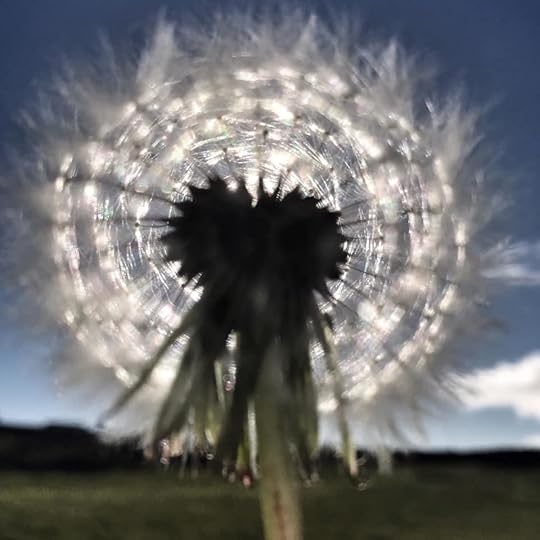
Last Time At The Buen
Say coyote and mean surprise.
Say fallen petals and mean the way you look at me.
Say espinaca and mean the color leaves learn at birth.
Say doorway and mean a courtyard from memory.
Say chocolate and mean little Buddha in the mouth.
Say febrero and mean first scent of sweet acacia on the wind.
When we are gone say lemon tree, say new buds, say palm fronds,
And mean that you loved it here.
Say maguey and mean thorny guardians of the heart.
Say mesquite and mean the rattle of later.
Say that twice and mean the rattle heard over long distances of night alone.
Say stars falling, and don't mean that.
Say fish in the quiet pond and mean early rain.
Say starfish and I can't tell you what that means.
Say cloud and mean a dream that wakes you.
Say glass table and mean the first step on a journey.
Say tamales and mean Kalamata olives.
Say I will give you what I have brought and mean voice.
Say doorway again and see what it means.
Say look one more time and mean thank you.
About Judyth Hill
Judyth Hill, poet, author, editor, teacher, educated at Sarah Lawrence, where she studied with Galway Kinnell and Robert Bly, is the author of nine books of poetry and the internationally acclaimed poem, Wage Peace, published worldwide; set to music, performed and recorded by national choirs and orchestras.
A recipient of grants from the Witter Bynner Poetry Foundation, the McCune Foundation, and New Mexico Endowment for the Humanities, Hill served as the Literature Coordinator for the New Mexico State Arts Division.
She is the current President of PEN San Miguel, conducts poetry and memoir workshops and classes at high schools and conferences world-round, including the San Miguel Writers Conference.
Hill leads global WildWriting Culinary Adventures in France, Mexico, Slovenia and Italy, and edits memoirs, novels and poetry manuscripts.
She was described by the St. Helena Examiner as, "Energy with skin" and by the Denver Post as, "A tigress with a pen".
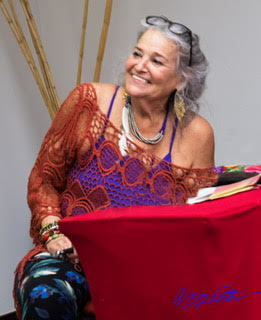
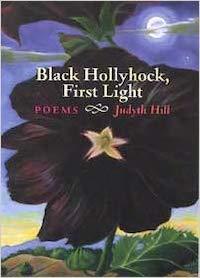

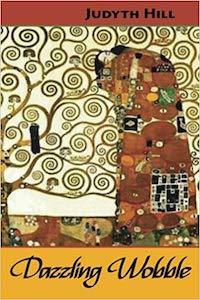
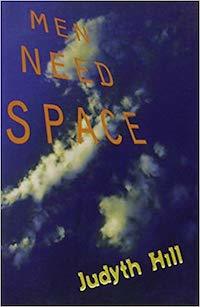

Dreaming of Stones
Christine Valters Paintner's new collection of poems Dreaming of Stones has just been published by Paraclete Press.
The poems in Dreaming of Stones are about what endures: hope and desire, changing seasons, wild places, love, and the wisdom of mystics. Inspired by the poet's time living in Ireland these readings invite you into deeper ways of seeing the world. They have an incantational quality. Drawing on her commitment as a Benedictine oblate, the poems arise out of a practice of sitting in silence and lectio divina, in which life becomes the holy text.
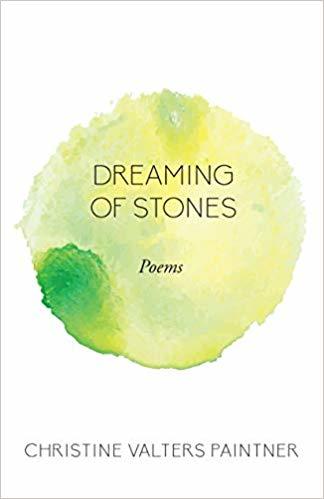
October 19, 2019
Monk in the World: Community 1 – Reflection by Christine with Art ~ A Love Note from Your Online Abbess
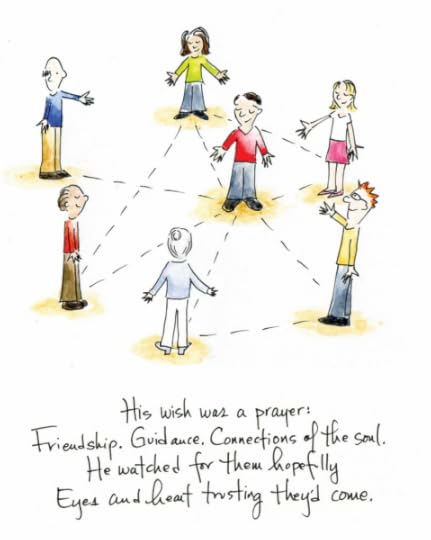 Dearest monks, artists, and pilgrims,
Dearest monks, artists, and pilgrims,
During this Jubilee year of sabbatical we are revisiting our Monk Manifesto by moving slowly through the Monk in the World retreat materials together every Sunday. Each week will offer new reflections on the theme and every six weeks will introduce a new principle.
Principle Three: I commit to cultivating community by finding kindred spirits along the path, soul friends with whom I can share my deepest longings, and mentors who can offer guidance and wisdom for the journey.
"To be a monk today or someone seeking to incorporate monastic values into his or her own life presumes being a part of a community of friends, people with whom a person can share the counsels of the heart and speak a language of the heart to one another."
—Edward Sellner, Finding the Monk Within: Great Monastic Values for Today
Traditional monasteries are built around the heart of shared community life. People would become monks as a way to live in an environment of support for contemplative living. In our modern world we often feel isolated from one another and it can be challenging to find meaningful relationships centered around the spiritual life.
In the Celtic monastic tradition the soul friend was considered to be an essential companion on the spiritual path. A soul friend is someone with whom you can share deeply about your struggles for meaning and your longings for how to shape your life. Henri Nouwen describes such a friend as one "who can be silent with us in a moment of despair or confusion, who can stay with us in an hour of grief and bereavement, who can tolerate not knowing… not healing, not curing." Soul friends offer us unconditional presence to whatever we may be experiencing. When we have this kind of relationship in our lives, it becomes easier for us to extend compassion to ourselves and others.
The spiritual life is meant to be lived in communion with one another, so as monks in the world, we have to create community in a variety of ways. Accountability and mutual encouragement is vital to sustaining contemplative and compassionate ways of being.
With great and growing love,
Christine
Christine Valters Paintner, PhD, REACE
Art © Kristin Noelle
Text: His wish was a prayer: guidance, connections of the soul, friendship. He watched for them hopefully, eyes and heart trusting they'd come.
October 15, 2019
Monk in the World Guest Post: Cindy Steffen
I am delighted to share another beautiful submission to the Monk in the World guest post series from the community. Read on for Cindy Steffen's reflection, "Instead, a Monk."
As I reluctantly walked toward the massive wooden doors of the stone church, every exhausted cell in my body shouted, "I don't want to be here! I don't want to do this! I don't want this life!"
It had been just over two months since my husband, Craig, suddenly died of a pulmonary embolism. A month after his passing, we were scheduled to leave on a long-awaited Peregrination; a road trip sabbatical with hopes to discover new callings for the second half of life. He was incredibly excited.
Now, I was utterly lost.
Once inside the Widows Group, I quickly found a chair and turned to hang my coat on the back. What I heard behind me I believe changed the course of my healing journey.
"So, how are you doing, Jane?
"Oh, you know, just trying to keep busy."
Upon hearing this, a huge lump formed in my throat and inside I screamed, "I am NOT doing it like that! I am not going to just keep busy, so I can forget the pain of losing my true companion!" Instinctively, I knew the "busy path" was not the right direction toward whatever new wholeness lie ahead. So, what did I do?
I became a monk, instead.
When the bottom drops out because of loss or tragedy, and we feel we are free-falling, it is best to hold on to the basics. So, as the desert father, Abba Moses, exhorted, I sat in my "cell" – a blue leather recliner in the family room and "let it teach me." I yelled, I sobbed, I cursed, I wished I could just dissolve, I prayed, and stared at the walls, either remembering or trying to listen, desperate for my lost connection.
Like St. Francis with his creatures, I surrounded myself with books to discover the wisdom of those who had also experienced great loss, both contemporary and ancient. I read and I read. If it didn't resonate with me, I put it down and picked up another. Through much reading, my instincts were validated; to embrace the pain of grief, to hold it close, is to heal from it.
I am still learning this.
One of the hardest realities of loss is truly understanding that your life will never be the same. In her book, An Alter in the World, Barbara Brown Taylor writes, "Reverence stands in awe of something – something that dwarfs the self, that allows human beings to sense the full extent of our limits." I felt beyond dwarfed. I became utterly limited. Somewhere in my soul, I knew I had to treat my grief with reverence and stand in awe of what this other side of love can do to a heart and soul.
So, on my first, "first" – my 60th birthday, one month after Craig's passing, I called my anam caras together to "sit Shiva" with me . . . or my version of the practice. I asked them to come sit on our/my bed, as I wailed and wrestled with God, repeatedly sobbing that I wanted him back and wasn't sure I could go on. When they weren't mourning with me, I asked them to make various soups in my kitchen and freeze them for the upcoming winter.
Sacred basics . . . soul friends and soup.
Journaling was also an essential and voracious practice I engaged in. Early writings revealed how much my world had drastically shrunk; I wrote that I didn't want to go anywhere, didn't want to be invited anywhere, wanted human interaction only on my terms, often didn't even answer the phone. So, I created a secret Facebook page for friends and titled it, My Journey of Grief, Small Days, and Hope. The theme of life became those "small days" and I surrendered to them; days when there was nothing to do but cry, or when all I could do was unload the dishwasher, then go watch a movie. When my chest felt like it was filling up with concrete, I grabbed the journal or computer and expressed the Job-like truths in my soul – dark, raw, and questioning as they were. But the tears that flowed from that writing cleansed the pain for at least one more hour; one more day. And looking back, I realize the wisdom I needed, which showed up on the pages between the pleading and the cursing, was Divine.
The last spiritual practice, and maybe the most important, was the daily walks I took with my dog. I call them my "weeping walks" because that is what I did. In winter, bike paths are empty, so lots of ugly crying and conversation took place between a new holy trinity . . . God, Craig and Myself. The beauty I would allow myself to see did its subtle and gracious work of slowly mending my broken heart. My morning ritual was a walk to the creek, leaning on a jutting branch of an old box elder, and telling Craig how much I loved and missed him. It's where I buried my head in my gloves that first winter and trusted that the prayer I could not speak was being uttered by groanings of the Spirit. It's where the realization took root that now my husband was also a spirit and our relationship would, indeed, be different.
It was not the life I wanted.
But it is a life I am growing into . . . quiet, intentional, transformational . . . rather like a monk.
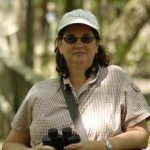 Cindy Steffen lives in SE Ohio, where she facilitates retreats for writers, seekers, and now widows through her business, Heart by Nature Retreats. She is the author of Sightings – Twenty-one Poems Observed. An avid birdwatcher, interpretive naturalist, and writer, Cindy is slowly finding her new normal. Visit her at CindyKSteffen.com and www.facebook.com/heartbynatureretreats.
Cindy Steffen lives in SE Ohio, where she facilitates retreats for writers, seekers, and now widows through her business, Heart by Nature Retreats. She is the author of Sightings – Twenty-one Poems Observed. An avid birdwatcher, interpretive naturalist, and writer, Cindy is slowly finding her new normal. Visit her at CindyKSteffen.com and www.facebook.com/heartbynatureretreats.
October 12, 2019
Monk in the World: Hospitality 6 ~ Reflection Questions and Closing Blessing ~ A Love Note from Your Online Abbess
 Dearest monks, artists, and pilgrims,
Dearest monks, artists, and pilgrims,
During this Jubilee year of sabbatical we are revisiting our Monk Manifesto by moving slowly through the Monk in the World retreat materials together every Sunday. Each week will offer new reflections on the theme and every six weeks will introduce a new principle.
Principle Two: I commit to radical acts of hospitality by welcoming the stranger both without and within. I recognize that when I make space inside my heart for the unclaimed parts of myself, I cultivate compassion and the ability to accept those places in others.
Spend some time in quiet reflection on the following questions. You might take out your journal and pen and free-write in response to see what you discover.
What would it mean for you to welcome in neglected parts of yourself?
When you consider hospitality, is there someone who comes to mind with whom you could practice?
Closing Blessing from Christine
Holy Presence of God,
you shimmer across time and space
and through each person and creature.
Create in me a welcoming space
to usher in the grace that newness offers.
May my heart be spacious
and my spirit free.
May your infinite compassion
grow in me like sunlight across a field,
luminous and radiant.
With great and growing love,
Christine
Christine Valters Paintner, PhD, REACE
Photo © Christine Valters Paintner
October 8, 2019
Featured Poet: Br. Paul Quenon
Last spring we launched a series with poets whose work we love and want to feature and will continue it moving forward.
Our next poet is Paul Quenon whose work is inspired by his monastic community, the natural environment, and most recently, personal experiences in meditation.Read his poetry and discover more about the connections he makes between poetry and the sacred.
This rather recent poem is based on my meditation practice which is mainly a matter of being present to the moment. God is in the actual and much else too.
Seashell of Time
This moment, cast up on your shoreline,
is from the sea of time.
Hold it to your ear and listen.
The whole ocean is inside sounding.
Within each moment
tides of hours are surging.
Within each hour fathoms of years.
Do not discard this present moment.
It curls inward to resounding canyons.
Hold the precious conch shell awhile and listen.
It's awash with centuries beneath centuries awash.
As a child you could not understand how the whole ocean could be inside a conch shell. As one adult in meditation, you know of totality within the particular.
Recent Developments in His Writing
Until now most of my poetry has been about my monastic environment and about natural life surrounding us in this Kentucky countryside. One of my books: Bells of the Hours (Fons Vitae, Louisville) had to do with the liturgical day and the frequent sound of tower bells. My latest book: Amounting to Nothing (Paraclete Press) ventures into a more metaphysical terrain at times, but still mostly abides among "a community of creatures".
Recently, since that book was completed, I am focusing on personal experiences in meditation. I have avoided this in the past since it can lead to bad poetry. Perhaps the time is ripe to cross that barrier and to speak of what the present moment of awareness is telling me. It may either speak of my awareness of God or bespeak the awareness God is speaking in me.
Some of this has been influenced by Meister Eckhart's Book of the Heart by Jon M. Sweeney and Mark S. Burrows. It comes from my desire to be true to the actual experience of prayer with no glamorizing or pretense. It sometimes leads me to express belief in things I didn't know I believed, and sometimes to say what I have long believed but never had words of my own to express.
Walking Meditation
I drift bare footed in dew drenched grass
wandering a crop of crosses
where monks who preceded
await my reception
outside of time.
I sense kind acquaintance
as each step presses in grass
soles to souls
assembled below
and above
outside of space.
The wash of dew is
cleansing, peace, and pleasure.
This brief moment waits
that blink upon time and space
of eternity's all encompassing
eye.
That blink of eternity's eye
Encompassing all
Space and time.
That blink of eternity's
All-encompassing eye
Upon time and space.

Poetry and the Sacred
Poetry, when it is real poetry, will take me beyond myself. It may or may not bring me to an awareness of the sacred, but at least it leads to an enlargement of my mind. To that extent it is a preparation for the divine. It may go no further than preparation. If I get an inkling it is going towards something transcendent I like to take it there without forcing it. At times it is better to leave higher things implicit, assuming that will speak for itself—leave the reader with an attuned ear to get the overtones.
Poetry is a discipline of its own, and prayer and meditation is another discipline of its own. You must respect the nature of each one. They stand in relationship with one another as analogies and can be of mutual assistance. But they can cause mutual interference as well. In practice, I suspend the urge to write during my period of meditation, so as to keep the integrity of that focus and that intention. Words are set aside to keep the single pointed mind.
Occasionally something in this simple and open-minded awareness might call for words. The words might be complaint about the evident barrenness of that experience or might as easily turn to comfort and gratitude that such is the way things are. It all pivots on how faith is responding.
There are times when the sacred may lead you to poetry, and there are other times when poetry leads you to the sacred. The crucial thing is to let that come spontaneously. Let it unfold itself as time unfolds which cannot be hurried or slowed. If I set out to make a poem sacred it will likely be a dud, forced, over-religious, a posture. A poem should be what it wants to be and will be implicitly holy if it is good.

The old farmers say you can hear corn growing in the night, and I borrow the expression for snowmelt and sun light. This is in my book: Afternoons with Emily – i.e. Dickenson, with Black Moss Press, Ontario.
Restless Silence
The enclosure wall runs the field,
ducks behind some pines
skirts the forest, dips and rises,
gently drops, then disappears.
Beyond, I can hear snow
melting in the woods.
What am I waiting for?
What enlightenment is in the sun
reflecting off the icy lake,
wearing it to a thin slick?
Dry grass in the wet field
is dusty with sunlight.
What is the grass waiting for?
A pigeon leaves a tree for another tree.
I can hear the sun
grazing the dusty grass,
until a breeze interrupts briefly
then settles for . . . a something . . .
Was it here already and gone?
Or was it only here
so I would come and wait?
Why this sadness when,
yielding to restlessness,
I rise and abandon what
never knows abandonment?
I must confess the urge to go write all this down is what made me restless.
About Paul Quenon
Paul Quenon has been a monk of the Abbey of Gethsemani in Kentucky since 1958. He received some encouragement in writing from his Novice Master Thomas Merton, and began publishing in 1995. His earlier poetry was with Black Moss Press in Ontario. Fons Vitae in Louisville has published Monkswear and Bells of the Hours. His memoir In Praise of the Useless Life is with Ave Maria Press.
Paraclete Press has published selected poems: Unquiet Vigil and most recently more poems Amounting to Nothing.

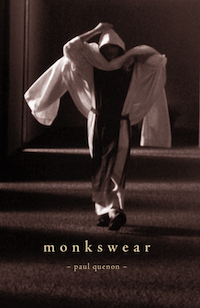
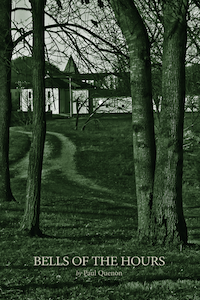
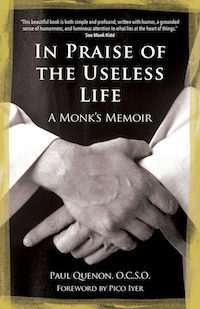
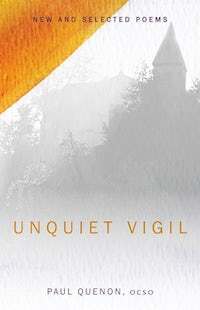
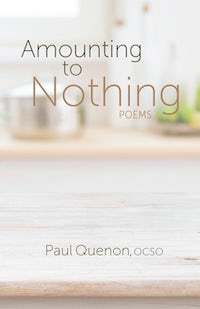

Dreaming of Stones
Christine Valters Paintner's new collection of poems Dreaming of Stones has just been published by Paraclete Press.
The poems in Dreaming of Stones are about what endures: hope and desire, changing seasons, wild places, love, and the wisdom of mystics. Inspired by the poet's time living in Ireland these readings invite you into deeper ways of seeing the world. They have an incantational quality. Drawing on her commitment as a Benedictine oblate, the poems arise out of a practice of sitting in silence and lectio divina, in which life becomes the holy text.

October 5, 2019
Monk in the World: Hospitality 5 ~ Suggestions for Practice ~ A Love Note from Your Online Abbess
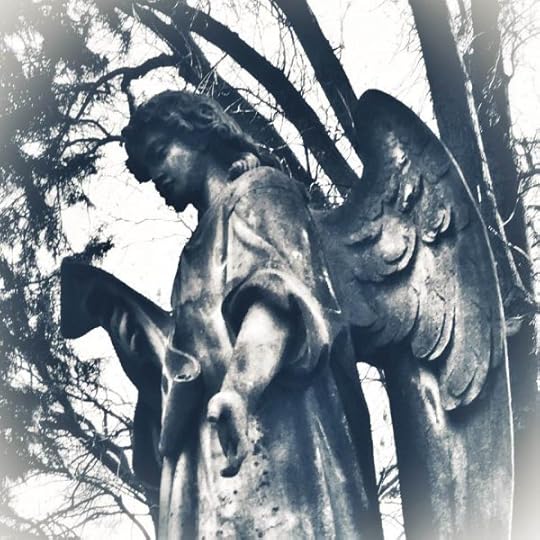 Dearest monks, artists, and pilgrims,
Dearest monks, artists, and pilgrims,
During this Jubilee year of sabbatical we are revisiting our Monk Manifesto by moving slowly through the Monk in the World retreat materials together every Sunday. Each week will offer new reflections on the theme and every six weeks will introduce a new principle.
Principle Two: I commit to radical acts of hospitality by welcoming the stranger both without and within. I recognize that when I make space inside my heart for the unclaimed parts of myself, I cultivate compassion and the ability to accept those places in others.
Today I offer a suggestion for practicing hospitality in your life.
Begin by pausing for a few moments and connecting to your breath. Gently draw your awareness down to your heart center and take some time to notice what you are feeling right now. See if you can make space for the truth of your experience without judgment or trying to change it. Then bring to your awareness what the mystics across traditions tell us – that the infinite compassion of God burns in our hearts. Breathe it in and allow it to fill you and your experience. Anytime you are feeling tender or hurt, allow some inner space to fill with compassion. Then extend that compassion to someone in your life whom you love. Then see if you can imagine this sacred compassion filling someone whom you find difficult.
How does this help you in your offering of hospitality to the stranger within and without?
With great and growing love,
Christine
Christine Valters Paintner, PhD, REACE
Photo © Christine Valters Paintner
October 1, 2019
Monk in the World Guest Post: Elaine Breckenridge
I am delighted to share another beautiful submission to the Monk in the World guest post series from the community. Read on for Elaine Breckenridge's reflection "Chickens and Kinship."
A few years ago, I signed the Monk Manifesto and pledged myself to "The Holy Disorder of Dancing Monks." I took the commitment seriously and adopted the Manifesto as my new Rule of Life. Most recently, the Spirit has given me an opportunity to go more deeply into practicing point four: "I commit to cultivating an awareness of my kinship with creation and a healthy asceticism by discerning my use of energy and things and letting go of what does not help nature to flourish."
I have always been attracted to the kinship with creation theme which is found in Celtic Christian writings–both in the ancient and contemporary texts. As an Episcopal priest, I have sought to incorporate more images of nature when designing liturgies, using a variety of Celtic texts to connect the worship with God's creation. I have enjoyed reading the stories of the saints and their special relationships with animals. However, the only embodied kinship I experienced with animals took place on St. Francis Day when it was my job to bless animals. It was fun to play with a kitten, pat puppy dogs or pose with a horse.
But it was only kinship for a day. Most of my practice of Celtic Spirituality has consisted of reading books in an arm chair in my living room, or, writing reflections at my computer for Abbey online classes. That has changed.
This spring I retired. I gave up my full-time ministry in a congregation and a suburban lifestyle, seriously downsized and moved to an island. The house we are currently renting is half the size and without many of the amenities to which I have become accustomed. Most inconveniently, there is no garbage disposal! I have never lived without a garbage disposal. The prospect was unpleasant as I did not want to begin composting. Fortunately, my son offered an alternative. He lives on a working farm just ten minutes away and has given me a chicken bucket. I save all of our food scraps for the bucket. He picks it up weekly, takes it to his chickens and leaves me with a clean bucket for the next week. The first time he brought us an empty bucket, he also brought a dozen eggs from the very chickens I had agreed to help support. They were and are the best eggs I have ever had in my life!
That prompted my visit to meet these chickens. I saw their home and helped to collect eggs from the nests. On that visit, I watched them strutting around a pile of food but not eating. Apparently, they had been given old bread from a local bakery. A day later, my son picked up my chicken bucket and I soon received a text and the following photo from my son, "Mom, the chickens really like your bucket!" They do appear to be feasting!
The first week of my life without a garbage disposal was soon transformed into my life with saving and blessing foods scraps for our chickens. I feel free to say "our" because I contribute to their diet by recycling our food waste. (I am pleased to say that my bucket continues to be a favorite!) And by my purchasing the eggs (and other farm products as well) I am also supporting the work and indeed the ministry of this farm. They are in the process of creating a little Eden, caring for the Earth and in turn contributing to the wellbeing of the humans who buy their food. And I am an active participant in this circle of life.
The circle has expanded. I have practiced a letting go of many of my creature comforts in this new environment. I am more conscious of the water and electricity I use. I am buying organic and eschewing plastics. We are trying a little gardening. I am taking small steps towards reducing my carbon footprint on the planet.
And I am spending more time outdoors and have taken up both forest and Puget Sound bathing. I now have a sense of my personal kinship with creation. I am not just practicing. I am living as a Celtic Christian and a disorderly, dancing monk. It is a joy to have traded in my living room arm chair for a beach chair on Camano Island.
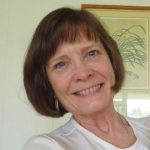 Elaine Breckenridge is a dancing monk and retired Episcopal priest living on Camano Island, Washington in Puget Sound. Currently she is doing some supply work for the Diocese of Olympia but is mostly enjoying forest and beach walks and shopping at local Farmers Markets. Her passions are the music of Kristopher E. Lindquist (Kelmusic.com), yoga and living the Abbey of the Arts Monk Manifesto.
Elaine Breckenridge is a dancing monk and retired Episcopal priest living on Camano Island, Washington in Puget Sound. Currently she is doing some supply work for the Diocese of Olympia but is mostly enjoying forest and beach walks and shopping at local Farmers Markets. Her passions are the music of Kristopher E. Lindquist (Kelmusic.com), yoga and living the Abbey of the Arts Monk Manifesto.



